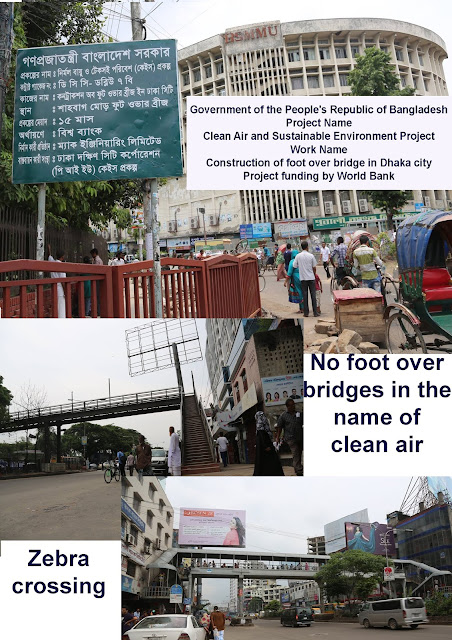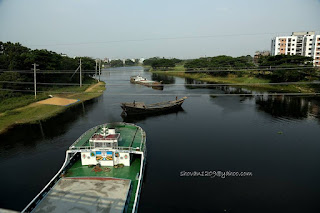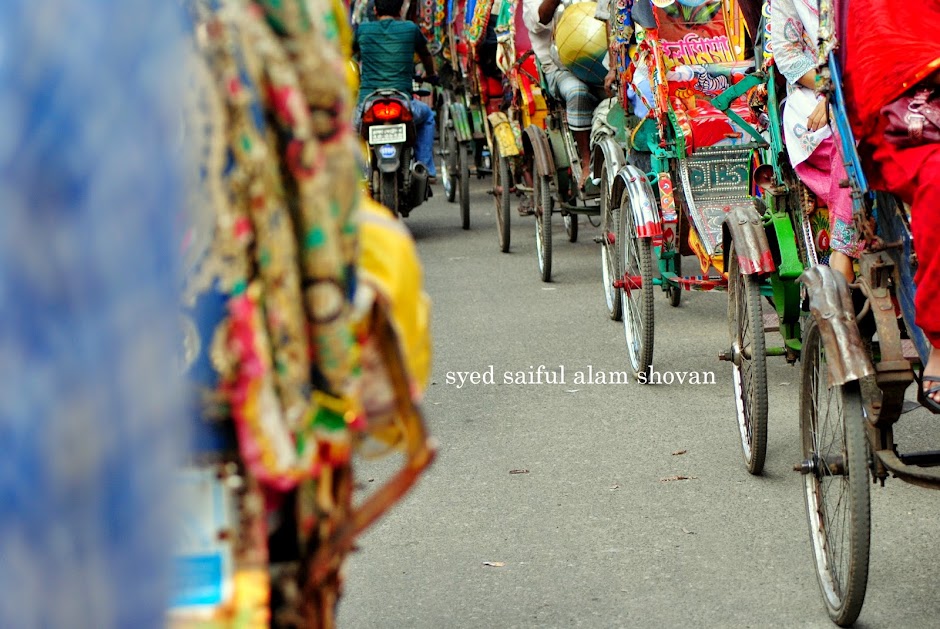Responses
to World Bank on Footover Bridges
The
World Bank says that in order to improve air quality and safe mobility in
Dhaka, one needed measure is more footover (pedestrian) bridges. On a recent
visit, the World Bank explained to us that in addition to building 70 km of
footpaths, an initiative for which we congratulate them, they are also building
a number of footover bridges. When pedestrians cross the street they slow down
cars, which makes the cars pollute more, they told us. Also, since there is little
or no enforcement at zebra crossings and intersections, the only safe way to
allow people to cross the street is through the use of the bridges. They
explained that the project began many years ago when the World Bank had not yet
spelled out a policy on universally accessible design, and in any case, with
virtually no other facilities for people with disabilities in Dhaka, why not
spend money building new infrastructure that is also inaccessible? They also
mentioned that the directors of one hospital had requested a footover bridge
because of staff being hurt or killed crossing the street. (Apparently the
patients visiting that hospital are sufficiently strong and healthy to make use
of the bridge. Or maybe since they’re already sick, it’s OK if they get run
over.)
When
we pointed out that they seemed to be saying that pedestrians are an obstacle
to cars, they explained that pedestrians also slow down other traffic on the
street, including buses. But they hastened to assure us that they had not said that pedestrians are the reason
that buses move so slowly.
They
further commented on the limited amount of road space in Dhaka, at about 7%
whereas they feel that over twice that is the minimum necessary. When we
commented that in a situation of limited road space, one should discourage,
rather than encourage, the most space-inefficient means (the private car) they
dropped that topic.

Throughout
the conversation, one thing was clear: the World Bank officials only regard
motorized trips as trips. They are trapped in car-based thinking. They consider
all non-motorized forms as unimportant and, worse, an obstacle to all those
important trips that are occurring with the use of fuel. Further, since
fuel-burning vehicles pollute, they suggested that non-motorized transport
including walking causes pollution by slowing down the otherwise smoothly
moving motorized transport. That cars are the main reason that cars and buses
are stuck in traffic does not appear to have occurred to them, nor did they
seem aware of the abundant work that has been done in the past few decades on
environmentally-friendly and people-focused transport policies to replace the
old car-based ideas. We can only imagine two possible explanations for the
World Bank’s refusal to acknowledge a more people-focused and
environmentally-friendly approach to transport: either they are unbelievably
ignorant that such possibilities exist, or their real interest is in selling
cars and car-based infrastructure.
The
Bank officials also mentioned that they are not in a position to tell the
government what to do; rather, they must respond to the government’s request.
Which is fine up to a point. But obviously funders have policies about what
they will and will not fund. Under a Clean Air and Sustainable Environment initiative, they
obviously could agree to fund footpaths and refuse to fund footover bridges.
Conversations with officials at the World Health Organization and the Asian
Development Bank have also made clear that while they cannot dictate what
governments do, they do have significant scope to engage in persuasion to adopt
(or not) more enlightened approaches. Finally, the holder of the purse strings
is obviously not without influence on the recipient.

The
Bank officials also said that they must listen to different perspectives and
that there are different views on this matter. We could not agree more. There
are people who have worked for years on transport and urban planning issues and
who have done research on successful and failed policies in cities around the
world. There are people who simply approach the issue with blind prejudice that
the car is the only means of transport. There are people who care about the
environment, about safety, about access for those with disabilities (special
needs), and about the poor, and there are people who only care about selling
cars. We personally do not feel that all opinions should be accorded equal
value.
And
now to have a little fun with what they said...
According
to the World Bank: Cars pollute. Cars main and kill. Let’s treat cars as the
kings of the road!
According
to the World Bank: There is not enough road space in Dhaka, so let’s prioritize
the most inefficient users, the car, while making life difficult for the more
efficient users, including pedestrians, bicycles, and rickshaws.
According
to the World Bank: People in cars are making trips. People on foot are creating
obstacles.
According
to the World Bank: Enforcement of road rules in Dhaka is poor. It is obviously
impossible to improve enforcement, so let’s just reward those causing the
problem and punish the victims. (More simply put: Drivers behave badly, so
let’s punish pedestrians.)
According
to the World Bank: We must listen to different sides and then ensure that those
being hurt are kept safe. Let’s say we had a problem with sexual harassment
(eve teasing) on the streets. We will invite men and women to discuss the
problem, in order to involve different stakeholders. The women complain that
they can’t move about the city without being subjected to rude remarks. The men
say that they are just being men. Hmm...it is difficult to make men behave and
respect women. Hmm...ah, I know! Let’s ban women from moving about the city!!
According
to the World Bank: Simple logic works. For example: cars pollute; pedestrians
slow cars; pedestrians pollute. This is akin to saying that tobacco creates
jobs; we need jobs; so let’s promote tobacco use. Just because a few statements
seem to lead to a logical conclusion does not mean that those statements are in
fact logical!
According
to the World Bank: It is difficult to create universally accessible design in
Dhaka so let’s start by adding more infrastructure that is obviously not
accessible!
According
to the World Bank: The long term is far away so let’s forget about it and focus
on the short term.
According
to the World Bank logic: If the thief is breaking your windows, hand him a key
to the door.
According
to the World Bank: Cars do not stop at intersections. Cars do not have to stop
to allow other cars to go. Too many cars in limited road space does not create
congestion. The main obstacle to the smooth movement of cars is pedestrians.
According
to the World Bank: If you’re only traveling a short distance and doing it
without the use of fuel, you may as well just stay home and make space for all
those important people moving about while using fuel, e.g. creating pollution,
congestion, and danger for everyone else.
According
to the World Bank: Pedestrians should not be on any road that is arbitrarily
labelled a highway, but it is OK for cars to enter the narrow lanes of Dhaka
even if that causes a long line of rickshaws to become stuck in traffic.
According
to the World Bank logic: If people surrendered their wallets to thieves, then
thieves wouldn’t need to carry a gun. So victims of crime make thieves
dangerous. (While this is possibly true, it is obviously utterly irrelevant!)
According
to the World Bank logic: If small kids can’t play on the playground because a
big bully keeps beating them up, and if you’ve repeatedly asked the bully to
stop but he has ignored you, then you should tell the children to stop playing
there...and declare the problem solved.
And
a final suggestion: If the real objective of your project is to promote the
smooth movement of cars in Dhaka, then change the name of the project to
“Promotion of Cars for a Polluted, Congested, & Unsafe Dhaka (PCPCUD).”
After all, if you accept, or worse, promote the idea that facilitating the
movement of cars is good for safety and the environment, you are damaging not
only the situation in the present, but for many years to come. This may be news
for you, but whether on foot, bicycle, rickshaw, or by motorized means, a trip
is a trip. The main difference is that some non-motorized modes do not pollute,
do not hurt or kill others, are good for the environment, and require little
road space, in direct contrast to motorized transport and especially to the
car. Treating the car as the king of the road will simply encourage more people
to drive and thus make all the problems caused by the car worse, not better.
#Footover_Bridges, #World_bank
Footover Bridges
World Bank






